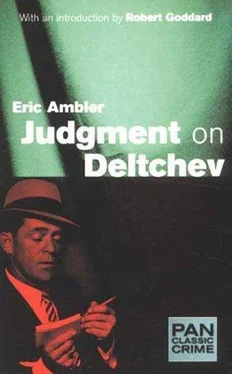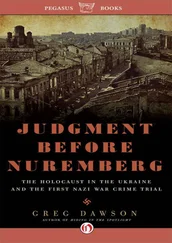Eric Ambler - Judgment on Deltchev
Здесь есть возможность читать онлайн «Eric Ambler - Judgment on Deltchev» весь текст электронной книги совершенно бесплатно (целиком полную версию без сокращений). В некоторых случаях можно слушать аудио, скачать через торрент в формате fb2 и присутствует краткое содержание. Год выпуска: 1977, ISBN: 1977, Издательство: Vintage, Жанр: Криминальный детектив, на английском языке. Описание произведения, (предисловие) а так же отзывы посетителей доступны на портале библиотеки ЛибКат.
- Название:Judgment on Deltchev
- Автор:
- Издательство:Vintage
- Жанр:
- Год:1977
- ISBN:9780307049971
- Рейтинг книги:4 / 5. Голосов: 1
-
Избранное:Добавить в избранное
- Отзывы:
-
Ваша оценка:
- 80
- 1
- 2
- 3
- 4
- 5
Judgment on Deltchev: краткое содержание, описание и аннотация
Предлагаем к чтению аннотацию, описание, краткое содержание или предисловие (зависит от того, что написал сам автор книги «Judgment on Deltchev»). Если вы не нашли необходимую информацию о книге — напишите в комментариях, мы постараемся отыскать её.
Judgment on Deltchev — читать онлайн бесплатно полную книгу (весь текст) целиком
Ниже представлен текст книги, разбитый по страницам. Система сохранения места последней прочитанной страницы, позволяет с удобством читать онлайн бесплатно книгу «Judgment on Deltchev», без необходимости каждый раз заново искать на чём Вы остановились. Поставьте закладку, и сможете в любой момент перейти на страницу, на которой закончили чтение.
Интервал:
Закладка:
When Aleko had taken over the conspiracy, Pazar had been in a pitiable state of exhaustion and terror. The arrest of Rila had cut off his drug supplies. He was without money or lodging and was hunted by the police. Philip, who then had (in the name Valmo) the room in the Patriarch Dimo, had taken him in, and for nearly a week the two had remained there, hungry, because they feared to go out to buy food, and in constant fear of discovery. The night Aleko arrived on the scene, Pazar had collapsed and was in a state almost of coma. It took him several days of ready access to the supplies of heroin, which Aleko had miraculously procured, to bring him back to anything like normality; and when he did come back, it was to find that he had been superseded.
Pazar was not unintelligent. Quite soon he perceived what Pashik already knew — that Aleko was not of the Brotherhood — but, unlike Pashik, he drew a wrong conclusion. His drug-twisted mind linked his discovery with his own fall from power and also with the memory of the traitor who had never been unmasked. All the paranoid projections of his mind focussed suddenly upon a single object — Aleko. From that moment he began to plot against Aleko and to spy on him. Philip had moved into Aleko’s apartment, and Pazar had the Patriarch Dimo room to himself. It was easy, therefore, for him to keep track of Aleko’s movements outside the apartment. One night he followed Aleko to a house in the suburbs. It was a big house and there was a car outside of the kind that usually has a chauffeur. Aleko was there an hour. When he came out Pazar did not follow him, but stayed to watch the house and the car. Ten minutes after Aleko had gone, a man came out, got into the car, and drove off. As he passed by, Pazar recognized him. It was Brankovitch. Two days later, seething with malice and excitement, he told Pashik of his discovery.
It took Pashik ten seconds to make up his mind what he had to do. The first thing was to control Pazar and urge discretion. The second thing was to make him tell the story to Philip Deltchev in Pashik’s presence so that while the boy would at last realize what was really happening, his desire for revenge could be usefully canalized. Obviously, Brankovitch’s idea was to destroy his rival within the Party and to put the guilt for the crime on the Deltchev family. In other words, he could manipulate the original conspiracy so as to convict the father and use the second conspiracy, his own, to dispose of Vukashin and have in his hands the perfect scapegoat, Philip. Pashik’s idea was to remove the scapegoat when it was too late to change the assassination plan and let the whole affair recoil on Brankovitch. What was more, Pashik knew just how the idea could be put into practice. But everything depended on Philip.
It was a ticklish business. When Philip’s first neurotic outbursts were spent he lapsed into a hopeless depression, which persisted for some days and which was noticed by Aleko. Fortunately, Pashik had managed to make his proposals understood, and Philip Deltchev had presence of mind enough to play the part he had been given. It was not too difficult. All he had to do was to continue to appear fanatically devoted to the task of killing Vukashin; and fanatics do not have to make much sense. The problem was Pazar. His hatred of Aleko soon wore so thin a disguise that an outburst of some sort was inevitable. All Pashik could do was to remind him constantly of the need for absolute secrecy, and hope that when the explosion came, Pazar the drug addict would be more in evidence than Pazar the conspirator. And so it turned out. The occasion was one of the bi-weekly meetings at which Aleko insisted on going over the entire plan of campaign afresh and rejustifying each part of it. The plan itself was simple enough, and clearly the object of the meetings was to keep the conspirators in hand; but that night Pazar chose to put a different interpretation on the meeting. Quite suddenly and fantastically he accused Aleko of having police hidden in an adjoining room to listen to the conversation. Without a word Aleko rose and showed the next room to be empty. Pazar replied that there were microphones hidden and began to tear up the carpet to prove it. Philip Deltchev sat as if he had not heard. Pashik sat sweating for what was to come. Aleko watched with a smile, but listened attentively to Pazar’s babbling. There was just enough sense in it for him to guess what Pazar had discovered. When, in the end, Pazar collapsed, sobbing, Aleko gave him a big injection of heroin. When Pazar was quiet, Aleko looked at the others and shook his head. ‘We cannot rely upon him,’ he said. ‘He will compromise us all.’
The other two nodded quickly. They were in heart-felt agreement.
Aleko smiled. ‘Leave everything to me,’ he said.
At the next meeting Pazar did not appear and Aleko announced briefly that he had committed suicide in his room, that the body would be left for the police to find, and that, as his services had never really been necessary, no Brother would be sought to replace him.
It was on the day after that meeting that I arrived.
I presented a serious problem to the harassed Pashik. To have someone in and about his office, poking and prying, hampering his movements, possibly endangering his neutral relations with the Propaganda Ministry — that was bad enough. To have someone directly concerned with him in contact with Petlarov was alarming, for who knew what that might not suggest to Brankovitch? He had already recognized and been recognized by Sibley, whom he remembered as one of the intelligence officers who could know his story.
Sibley knew me. Another potential danger. Especially as I was inquisitive. My interview with Madame Deltchev threw him into a panic. The night he learned of it, he faced Aleko with his gun in his pocket instead of in his briefcase. But nothing unusual happened at that meeting. It was after it that Aleko took him aside, gave him a wad of papers, and asked him to put them in Pazar’s room to ‘mislead’ the police who found them. Pashik guessed that Brankovitch wished to take the opportunity afforded by Pazar’s death of planting further incriminating evidence against Deltchev. When he got to Pazar’s room, he found me there.
His dilemma was awful. I could be explained in several ways. I was telling him the truth or I was lying. But even if I was telling the truth I might still be an unwitting agent of Brankovitch’s and this might be a trap to catch him out. On the other hand, I was doing work for one of the American clients and was therefore under the protection of the Pan-Eurasian Press Service. If this was a trap, then the only safe thing to do was to take me to Aleko for questioning. If it was not a trap, however, he might be taking the representative of an American client to his death.
‘What made you decide to take me?’ I asked.
Pashik blinked at me sheepishly. ‘I did not quite decide, Mr Foster,’ he said, ‘I compromised. I left part of the decision to you.’
‘What do you mean?’
‘While I hid the papers Aleko had given me in the room, you were walking to my car at the end of the street. I thought you might take the opportunity to escape. If you did not-’ He shrugged.
‘Do you know why I didn’t run?’
‘Because you were not alarmed?’
‘No. Because I wanted to ask you questions.’
He sighed. ‘You have been very lucky, Mr Foster,’ he said. ‘It was difficult to persuade Aleko that you were harmless, and very embarrassing when he found that you were not. I certainly did not expect to find you alive this morning. And when you tell me of Katerina’s foolishness I marvel.’
‘I suppose she got back all right.’
‘If she had not done so you would not be here. The check on the Deltchev house is carried out at eight every morning.’
Читать дальшеИнтервал:
Закладка:
Похожие книги на «Judgment on Deltchev»
Представляем Вашему вниманию похожие книги на «Judgment on Deltchev» списком для выбора. Мы отобрали схожую по названию и смыслу литературу в надежде предоставить читателям больше вариантов отыскать новые, интересные, ещё непрочитанные произведения.
Обсуждение, отзывы о книге «Judgment on Deltchev» и просто собственные мнения читателей. Оставьте ваши комментарии, напишите, что Вы думаете о произведении, его смысле или главных героях. Укажите что конкретно понравилось, а что нет, и почему Вы так считаете.












